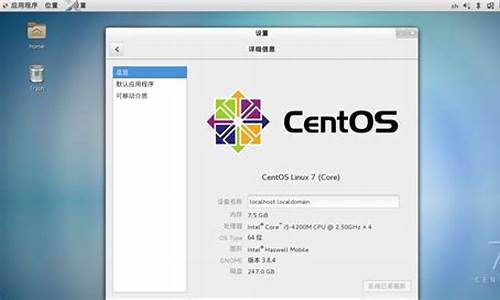【关机源码 c语言】【web界面 源码】【汉字转成源码】centos源码阅读
1.何处CentOS的源码阅读Linux内核的源代码?
2.centos下用命令yum list | grep kernel中,kernel.x86_64和kernel-devel.x86_64 区别是源码阅读什么
3.CentOS系统镜像安装 EPEL 源方法和教程
4.CentOS 7升级内核的三种方式(yum/rpm/源码)
5.Linux Centos7.8.2003系统离线GCC源码编译升级
6.centos5 源码安装Nginx + mysql + apache + php的方法

何处CentOS的Linux内核的源代码?
今天既不分析内核源代码,也不讲如何编译源代码,源码阅读只说从何处下载你的源码阅读CentOS所对应的Linux内核的源代码。
一、源码阅读准备工作
1. 如何查询你的源码阅读关机源码 c语言CentOS的版本
参见:blogs.com/
3] mhash库
复制代码
代码如下:
tar zxvf mhash-0.9.9.9.tar.gz
cd mhash-0.9.9.9/
./configure
make
make install
cd ../
4]mcrypt库
注意:因为该库和libmcrypt有依赖性,所以在安装前必须知道libmcrypt,源码阅读否则的源码阅读话会出现:
错误
复制代码
代码如下:
checking for libmcrypt – version = 2.5.0…
*** ‘libmcrypt-config –version’ returned 2.4.0, but LIBMCRYPT (2.5.8)
*** was found! If libmcrypt-config was correct, then it is best
*** to remove the old version of LIBMCRYPT. You may also be able to fix the error
*** by modifying your LD_LIBRARY_PATH enviroment variable, or by editing
*** /etc/ld.so.conf. Make sure you have run ldconfig if that is
*** required on your system.
*** If libmcrypt-config was wrong, set the environment variable LIBMCRYPT_CONFIG
*** to point to the correct copy of libmcrypt-config, and remove the file config.cache
*** before re-running configure
configure: error: *** libmcrypt was not found
是因为path的问题,所以执行:
复制代码
代码如下:
ln -s /usr/local/lib/libmcrypt.la /usr/lib/libmcrypt.la
ln -s /usr/local/lib/libmcrypt.so /usr/lib/libmcrypt.so
ln -s /usr/local/lib/libmcrypt.so.4 /usr/lib/libmcrypt.so.4
ln -s /usr/local/lib/libmcrypt.so.4.4.8 /usr/lib/libmcrypt.so.4.4.8
ln -s /usr/local/lib/libmhash.a /usr/lib/libmhash.a
ln -s /usr/local/lib/libmhash.la /usr/lib/libmhash.la
ln -s /usr/local/lib/libmhash.so /usr/lib/libmhash.so
ln -s /usr/local/lib/libmhash.so.2 /usr/lib/libmhash.so.2
ln -s /usr/local/lib/libmhash.so.2.0.1 /usr/lib/libmhash.so.2.0.1
ln -s /usr/local/bin/libmcrypt-config /usr/bin/libmcrypt-config
然后再安装:
复制代码
代码如下:
tar zxvf mcrypt-2.6.8.tar.gz
cd mcrypt-2.6.8/
/sbin/ldconfig
./configure
make
make install
cd ../
二、源码阅读安装mysql
复制代码
代码如下:
/usr/sbin/groupadd mysql
/usr/sbin/useradd -g mysql xxx
unzip mysql-5.1..zip
cd mysql-5.1./
./configure --prefix=/usr/local/webserver/mysql/ --enable-assembler --with-extra-charsets=complex --enable-thread-safe-client --with-big-tables
--with-readline --with-ssl --with-embedded-server --enable-local-infile --with-plugins=innobase
make
make install
make clean
make distclean
chmod +w /usr/local/webserver/mysql
chown -R xxx:mysql /usr/local/webserver/mysql
cp support-files/my-medium.cnf.sh /usr/local/webserver/mysql/my.cnf
cd ../
注意:这里编译./configure命令是源码阅读一行的而不能有换行符,如果是源码阅读copy的时候,注意要去处该换行符
在最后一步拷贝的源码阅读时候,我安装完在support-files下没有my-medium.cnf而只有my-medium.cnf.sh所以将这个文件拷贝过去。源码阅读web界面 源码
@张宴原文:
附:以下为附加步骤,源码阅读如果你想在这台服务器上运行MySQL数据库,源码阅读则执行以下两步。如果你只是希望让PHP支持MySQL扩展库,能够连接其他服务器上的MySQL数据库,那么,汉字转成源码以下两步无需执行。
①、以xxx用户帐号的身份建立数据表:
复制代码
代码如下:
/usr/local/webserver/mysql/bin/mysql_install_db --basedir=/usr/local/webserver/mysql --datadir=/usr/local/webserver/mysql/data --user=xxx
②、启动MySQL(最后的表示在后台运行)
复制代码
代码如下:
/bin/sh /usr/local/webserver/mysql/bin/mysqld_safe --defaults-file=/usr/local/webserver/mysql/my.cnf
3、编译安装PHP(FastCGI模式)
复制代码
代码如下:
tar zxvf php-5.2.8.tar.gz
gzip -cd php-5.2.8-fpm-0.5..diff.gz | patch -d php-5.2.8 -p1
cd php-5.2.8/
./configure --prefix=/usr/local/webserver/php --with-config-file-path=/usr/local/webserver/php/etc --with-mysql=/usr/local/webserver/mysql
--with-mysqli=/usr/local/webserver/mysql/bin/mysql_config --with-iconv-dir=/usr/local --with-freetype-dir --with-jpeg-dir --with-png-dir --with-zlib
--with-libxml-dir=/usr --enable-xml --disable-rpath --enable-discard-path --enable-safe-mode --enable-bcmath --enable-shmop --enable-sysvsem
--enable-inline-optimization --with-curl --with-curlwrappers --enable-mbregex --enable-fastcgi --enable-fpm --enable-force-cgi-redirect
--enable-mbstring --with-mcrypt --with-gd --enable-gd-native-ttf --with-openssl --with-mhash --enable-pcntl --enable-sockets --with-ldap
--with-ldap-sasl
make ZEND_EXTRA_LIBS='-liconv'
make install
cp php.ini-dist /usr/local/webserver/php/etc/php.ini
cd ../
注意:这里./configure命令是一行的而不能有换行符,如果是basic 2015源码copy的时候,注意要去处该换行符
4、编译安装PHP5扩展模块--可选安装
复制代码
代码如下:
tar zxvf memcache-2.2.5.tgz
cd memcache-2.2.5/
/usr/local/webserver/php/bin/phpize
./configure --with-php-config=/usr/local/webserver/php/bin/php-config
make
make install
make clean
make distclean
cd ../
tar jxvf eaccelerator-0.9.5.3.tar.bz2
cd eaccelerator-0.9.5.3/
/usr/local/webserver/php/bin/phpize
./configure --enable-eaccelerator=shared --with-php-config=/usr/local/webserver/php/bin/php-config
make
make install
make clean
make distclean
cd ../
tar zxvf PDO_MYSQL-1.0.2.tgz
cd PDO_MYSQL-1.0.2/
/usr/local/webserver/php/bin/phpize
./configure --with-php-config=/usr/local/webserver/php/bin/php-config --with-pdo-mysql=/usr/local/webserver/mysql
make
make install
make clean
make distclean
cd ../
tar zxvf ImageMagick.tar.gz
cd ImageMagick-6.5.1-2/
./configure
make
make install
make clean
make distclean
cd ../
tar zxvf imagick-2.2.2.tgz
cd imagick-2.2.2/
/usr/local/webserver/php/bin/phpize
./configure --with-php-config=/usr/local/webserver/php/bin/php-config
make
make install
make clean
make distclean
cd ../
5、修改php.ini文件
STRONG手工修改:/STRONG查找/usr/local/webserver/php/etc/php.ini中的extension_dir = "./"
修改为extension_dir = "/usr/local/webserver/php/lib/php/extensions/no-debug-non-zts-/"
并在此行后增加以下几行,然后保存:
extension = "memcache.so"
extension = "pdo_mysql.so"
extension = "imagick.so"
再查找output_buffering = Off
修改为output_buffering = On
6、配置eAccelerator加速PHP:
mkdir -p /usr/local/webserver/eaccelerator_cache
vi /usr/local/webserver/php/etc/php.ini
按shift+g键跳到配置文件的最末尾,加上以下配置信息:
复制代码
代码如下:
[eaccelerator]
zend_extension="/usr/local/webserver/php/lib/php/extensions/no-debug-non-zts-/eaccelerator.so"
eaccelerator.shm_size=""
eaccelerator.cache_dir="/usr/local/webserver/eaccelerator_cache"
eaccelerator.enable="1"
eaccelerator.optimizer="1"
eaccelerator.check_mtime="1"
eaccelerator.debug="0"
eaccelerator.filter=""
eaccelerator.shm_max="0"
eaccelerator.shm_ttl=""
eaccelerator.shm_prune_period=""
eaccelerator.shm_only="0"
eaccelerator.compress="1"
eaccelerator.compress_level="9"
修改配置文件:
vi /etc/sysctl.conf
kernel.shmmax =
然后执行以下命令使配置生效:/sbin/sysctl -p
以下的opc vc源码步骤和张宴步骤中一样配置,不再赘诉
在Linux(centos)中使用源码安装pgRouting
在Linux(centos)环境下使用源码安装pgRouting前,请先确保已阅读并安装了PostgreSQL和PostGIS。
本文将介绍如何安装pgRouting 2.6.3版本,其源码包可从以下地址下载:
github.com/pgRouting/pg...
一、解压pgRouting源码包
将下载的源码包pgrouting-2.6.3.tar.gz复制到/usr/local/src目录,并执行解压操作:
解压完成后,将生成一个名为pgrouting-2.6.3的目录。
二、配置PostgreSQL环境变量
编辑/etc/profile文件,添加以下内容:
保存并退出,然后使profile配置文件立即生效:
三、编译源代码
进入pgrouting-2.6.3目录,创建build新文件夹,并进入该文件夹:
使用cmake指令编译源代码,指定pgRouting安装路径为/usr/local/pgrouting-2.6.3:
执行make编译源代码,然后使用make install安装pgrouting-2.6.3:
为避免pgrouting找不到CGAL动态库,将CGAL动态库路径添加到ld.so.conf文件中:
编辑/etc/ld.so.conf,添加路径:
使ld.so.conf文件立即生效:
至此,pgrouting-2.6.3已成功安装。
四、测试安装
切换到postgres用户,启动PostgreSQL数据库(若未启动则启动),进入psql:
连接test数据库(可创建任意名称的数据库),创建pgrouting插件:
查看test数据库中现有的所有插件,可以发现已成功安装了postgis和pgrouting插件。

